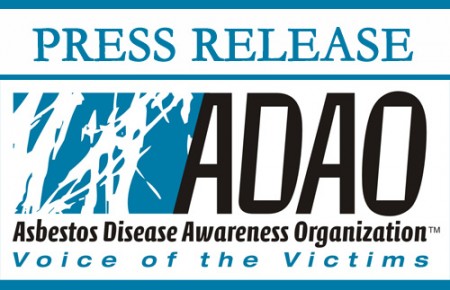
ABOUT Sarah McOnie and Linda Reinstein: “It’s not what you know, it’s who you know!”
Press Release Courtesy of The McOnie Agency
For Immediate Release: March 10, 2015
11th Annual Asbestos Awareness Conference
40 Global Asbestos Experts to present, 17-19 April 2015
Washington DC, USA – March 10, 2015. The Asbestos Disease Awareness Organisation (ADAO), which combines education, advocacy, and community to help ensure justice for asbestos victims, is to host its 11th Annual Asbestos Awareness Conference in Washington, USA, 17-19 April, 2015. The theme this year, “Where Knowledge and Action Unite” will be debated and supported with presentations from 40 asbestos experts and victims coming together from across the world.
Asbestos is a known carcinogen and there is no safe level of exposure but it has been used widely as a construction and fireproofing material since the end of the 19th century. If a worker or a member of their family is exposed to asbestos they are at increased risk of developing asbestos related lung cancer, mesothelioma and asbestosis. These conditions don’t care who they affect, limit life and cause an agonizing death.
The latest developments in disease prevention, global advocacy and treatment for mesothelioma and other asbestos caused diseases will be top of the agenda at the conference that will also include four powerful, cutting edge sessions:
- Progress and challenges from the front line
- Medical advancements: Diagnosing and treating mesothelioma and other asbestos
related diseases - Prevention: What is it? Where is it? What do I do?
- Advocacy: Global Ban Asbestos Action
The Conference also underscores ADAO’s new “Hear Asbestos. Think Prevention.™” campaign that is focused on continual global efforts aimed at preventing asbestos exposure to help end the tragedy of asbestos disease.
The World Health Organisation estimates that approximately 125 million people across the world are exposed to asbestos in the workplace and 107,000 people die each year as a result Linda Reinstein, ADAO President and Co-founder explains, “Only 55 countries have banned asbestos despite the unquestionable facts and countless deaths. We cannot continue the fight to reduce the exposures and deaths alone. This global Conference is open to anyone who has an interest in learning more about asbestos, the life limiting illnesses it causes and the things countries, governments and workers need to do to prevent these appalling diseases. If we all work together we can achieve a worldwide ban and prevent unnecessary deaths.” For further information on the Conference and to register to attend please visit: www.asbestosdiseaseawareness.org/archives/29969 ### About the Asbestos Disease Awareness Organization Media Contact: [1] The World Health Organisation Notes to editors: Asbestos – the facts: History of Asbestos use across the world:
The Asbestos Disease Awareness Organization (ADAO) was founded by asbestos victims and their families in 2004. ADAO is the largest non-profit in the U.S. dedicated to providing asbestos victims and concerned citizens with a united voice through our education, advocacy, and community initiatives. ADAO seeks to raise public awareness about the dangers of asbestos exposure, advocate for an asbestos ban, and protect asbestos victims’ civil rights. For more information, visit www.asbestosdiseaseawareness.org.
Sarah McOnie or Mary Fitzgerald
The McOnie Agency
+44 (0) 1483 414 751
sarah@mconieagency.com
maryd@mconieagency.com
on asbestos whilst Japan and New Zealand have banned the use of asbestos in new construction builds. The
USA, India, Indonesia, China, Russia and Brazil have continued widespread use of asbestos.
